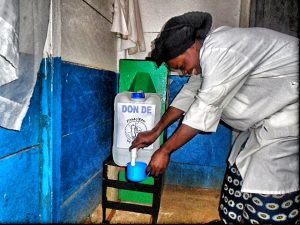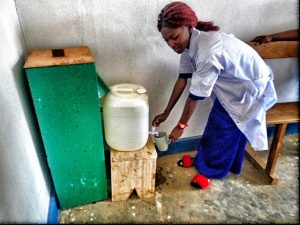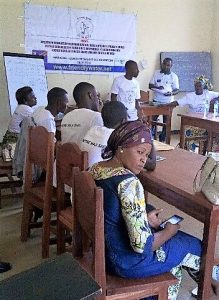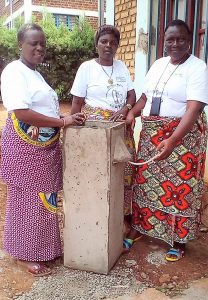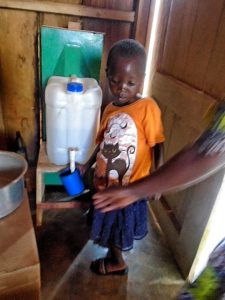This project in the Democratic Republic of Congo is made possible through the partnership of Water Charity and the National Peace Corps Association, working with Friendly Water for the World.
The training of the nurses in Beni has been COMPLETED. Read about the #conclusion below!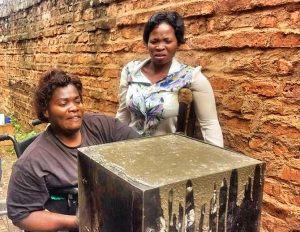
Location
North Kivu town of Beni, R D Congo Province
Community Description
Communities of the territory of Beni, in the province of North Kivu, have been victims of repetitive violent attacks to the civilian populations from October 2014 to today. In addition, cases of sexual violence, kidnapping; murder and other cases of abuse have been identified in this part of the Democratic Republic of the Congo.
These attacks have had a severe humanitarian impact, characterized by movements of populations in the different areas of the territory of Beni, which include the ZS of Mutanga, the ZS of Eringeti, the ZS of Oicha, the Kalunguta ZS, and the city of Beni. These movements are more concentrated on the South for their safety, i.e. Beni and Kalunguta.
An official state of alert is in effect for this area around the water situation. Lack of access to clean drinking water keeps getting worse, increasing the state of alert. Cases of waterborne diseases, which have already been identified in some corners of urban health centers of Beni, motivate the design and execution of this project to decrease the levels of public stress and contribute to eradicating the waterborne disease. Waterborne illnesses have long been identified as a prime form of vulnerability for these already vulnerable communities.
The health zone of Beni has an estimated population of at least 500,000 inhabitants, but without a proper water filtration system, they can estimate an increase in waterborne diseases in the area. Waterborne diseases are the 2nd leading cause of death in the region, after malaria (which has stagnant water pools as its vector of spreading).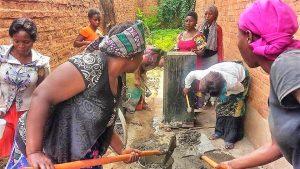
Problem Addressed
The goal of this project is to train 20 people in the construction of bio-sand water filters: ‘Strengthening capacities of 10 members of the association of nurses and 10 community leaders in the fight against water-related diseases by training in construction and use of the bio-sand filters in the city of Beni.’
Through this project, the NGO CONTAD CONMIGO/DRC, in concert with Water Charity & Friendly Water For The World, aims to contribute to a 30% reduction in the rate of cases of waterborne diseases identified in the area of health around Beni through its targeted medical facilities.
Project Description
The project is in collaboration with the Urban Health District of Beni. The approach is to train 10 community nurses association members and 10 leaders who will, in turn, go on to train community members to spread the knowledge to different social levels of the areas affected by the health alert. The success of this project will most certainly create a ripple effect, as the people trained to train others and the knowledge of this life-saving technique spreads, benefiting other areas of health in the Province of North Kivu.
The training will focus on two phases: The first will focus on the theoretical aspects, and the second on the practice. All 20 participants will be provided with teaching materials for the manufacturing and installation of bio-sand filters. We hope to will ensure the mastery and capacity of 10 people trained to increase better outcomes in their community health centers and 10 other members of the association for the manufacturing and installation of filters. Materials will be at their disposal and materials will be transported to create the activities of four days. The theoretical part will take 1 day and the practice 3 days. The last will be devoted to the assessment of the work of the trainees.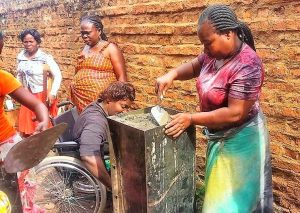
Community Organization
NGO Contad Conmigo/DRC
Project Impact
This project will train 20 community members directly: 10 Member Association of nurses and 10 community leaders. The plan is to continue spreading this knowledge through the different levels of the community. Increased use of filters will positively impact the health of the entire community.
Indirect beneficiaries:
- The communities in the area of urban Beni identified within the areas of health centers involved in this project.
- The families who will find at their disposal quality drinking water and knowledge acquired in manufacturing, use, maintenance of the bio-sand filters.
- Internal displaced communities / IDPS living in foster in the identified areas of health.
- The community Relay Agents / ARC of medical facilities will benefit from the training by 20 trained staff-led activities
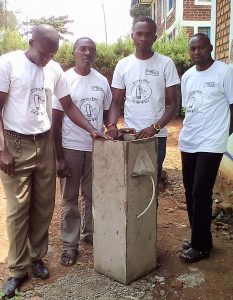 Friendly Water for the World Volunteer Directing Project
Friendly Water for the World Volunteer Directing Project
David Albert
Monitoring and Maintenance
To assess the reliability of the success of the project, trained staff will be evaluated on their level of adaptation and learning during the training.
After training, these staff will be tracked monthly where they make bio-sand filters in their medical associations and where they will benefit from technical assistance of CONTAD CONMIGO officers, who will then provide a follow-up report and guidance.
In the end, a community monitoring system will be also be executed by members of the community. Those trained and experienced will ensure this monitoring by permanent guidance and assistance offered to the community. They will share their reports with Contad Conmigo, Water Charity and Friendly Water for the World. This system will allow a permanent reconciliation between the recipients in the field and will ensure a permanent exchange of experiences between communities. Interactive communication with international staff will be available for the follow-up to the members of the association formed within the communities.
These monitoring activities will be carried out on a monthly basis. They will focus on the control of manufacturing techniques, use, and maintenance of the filters. The influence on consumer culture of clean water for consumption is the major objective, along with the fight against water-related diseases. The consumption of clean water through the production and use of bio-sand filters will be assessed for its beneficial effects on the overall health of the community, with the children being most impacted generally.
To sustain the activities, committees have been created in the region focusing on the health areas targeted. These Biosables (SFBC) committees are meeting in Beni town and other circles of the region.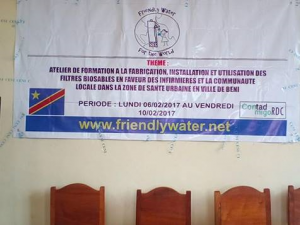 These committees will be involved in community outreach on topics covering the use of filters biosables, their manufacturing and maintenance issues.
These committees will be involved in community outreach on topics covering the use of filters biosables, their manufacturing and maintenance issues.
Benefits
1) Twenty direct beneficiaries whose 10 members of the association of nurses and 10 community leaders are trained in manufacturing, use, and maintenance of the filters.
2) Ten facilities in the area of urban health of Beni have their capacities strengthened in manufacturing, use, and maintenance of the filters
3) One “area of health” is strengthened, the capacity of techniques to prevent and fight against water-related diseases by the manufacturing system, use, and maintenance of the filters.
4) The city of Beni, a center of travel to the East of DR Congo, and a destination for displaced persons and refugees will have a strengthened capacity to combat waterborne diseases.
Funding
This project has been funded by an anonymous donor.
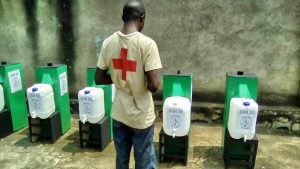
Training of the nurses in Beni, DRC has been concluded!
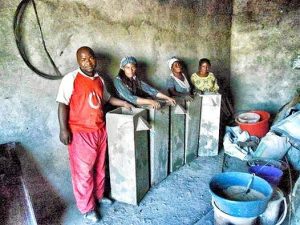 Friendly Water’s Medical Officer Dr. Kambale Musubao (Goma, Congo-DRC) lead a six-day training program along with Contad Conmingo and the Congo Orphan’s Trust. The training brought together 10 nurses and 10 community leaders to form a cooperative to fabricate, sell, distribute, and install BioSand Water Filters.
Friendly Water’s Medical Officer Dr. Kambale Musubao (Goma, Congo-DRC) lead a six-day training program along with Contad Conmingo and the Congo Orphan’s Trust. The training brought together 10 nurses and 10 community leaders to form a cooperative to fabricate, sell, distribute, and install BioSand Water Filters.
Beni has been going through some very tough times, with high levels of military and guerrilla activity, and with tens of thousands of refugees streaming into the town. The health clinics, hospitals, and orphanages have been full to overflowing. Yet, at the same time, the overwhelming majority of trained nurses are unemployed, as there is no money to pay them.
So the idea is to make use of their skill and commitment to bring clean water to the community, to clinics, and to refugee settlements. As part of the larger medical community, the nurses are in a perfect position to raise consciousness about the singular importance of clean water. At the same time, community leaders will go out and promote the use of BioSand Filters to the larger community. We view this as a pilot project, one that can likely be reproduced in many areas.
Since the training in July, the group already made and installed dozens of filters. The group also made a series of visits to the homes where the BSFs were installed, and are returning for monitoring and making sure the filters are fully operational. Monitoring and evaluation are scheduled to be done monthly by the group.
All in all, a tremendous success, and one with far-reaching consequences. Filters produced because of this training are being used at medical clinics, refugee stations, orphanages, and other such community buildings. As the techniques are re-taught, the knowledge will spread far and wide in the region. We can already see the immense ripple effect the training is having.
